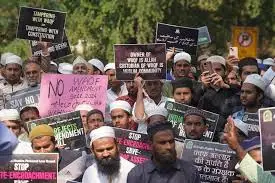AIMPLB, BJP on their marks, Bihar heats up as Waqf battleground ahead of Assembly race

Bihar is heating up politically with the Assembly elections drawing near. The battle over Waqf properties has taken center stage. Both the All India Muslim Personal Law Board (AIMPLB) and the Bharatiya Janata Party (BJP) are positioning themselves strongly. This issue is becoming a major factor in the state’s political landscape.
What Are Waqf Properties and Why Do They Matter?
Waqf properties are assets donated for religious or charitable purposes in the Muslim community. These include land, buildings, and other resources meant to benefit the community. However, across India, and especially in Bihar, managing these properties has been complicated. Reports of mismanagement, illegal encroachments, and corruption have caused concern.
The BJP has criticized the current handling of Waqf properties. They claim there is widespread corruption and illegal grabbing of Waqf land. Meanwhile, the AIMPLB argues that these allegations are politically motivated. They warn that such accusations aim to divide communities ahead of the elections.
BJP’s Stand on Waqf Properties in Bihar
The BJP is using the Waqf issue as a major campaign plank. They promise to bring transparency and stricter governance to Waqf boards. Their leaders say this will protect the properties and ensure they serve their intended purpose. Moreover, BJP hopes to attract Hindu voters and moderate Muslims who feel alienated by current management.
The party claims that reforming Waqf governance is essential for law and order. They argue that past negligence has allowed illegal encroachments and loss of community assets. The BJP is positioning itself as the party that will clean up the system.
AIMPLB’s Response and Concerns
On the other hand, the AIMPLB has strongly opposed the BJP’s approach. The Board insists that the government’s actions interfere with Muslim religious rights. AIMPLB leaders say the BJP’s focus on Waqf is part of a larger political strategy to polarize voters. They fear this could lead to communal tension.
Instead of political control, AIMPLB calls for safeguarding the autonomy of Waqf institutions. They demand that reforms, if needed, should be done with the consent of the community. The Board also highlights the social welfare work done by Waqf boards, which they say is often ignored.
Political Implications Ahead of the Elections
With the Assembly polls near, the Waqf issue has become a flashpoint. Several constituencies with large Muslim populations are watching closely. Political analysts believe the BJP’s campaign could influence voter sentiment among moderate Muslims. At the same time, it could consolidate Hindu votes.
Meanwhile, parties like the Rashtriya Janata Dal (RJD) and Congress are also reacting. These parties have traditionally counted on Muslim support. They see the BJP’s stance as an attempt to disrupt that support base. In turn, they are strengthening their ties with Muslim leaders and organizations like AIMPLB.
Voices from the Ground
Across Bihar, community reactions vary. In urban areas, Muslim youth activists largely back AIMPLB. They see the BJP’s focus as an attack on Muslim rights. However, some moderate Muslims are open to reforms that improve transparency and accountability.
Hindu community leaders generally welcome BJP’s approach. They say addressing illegal encroachments on Waqf lands will protect broader property rights. They also believe it could improve communal harmony by enforcing the law equally.
Historical Context of Waqf in Bihar
Historically, Waqf properties have played an important role in Bihar’s Muslim community. These properties have funded schools, hospitals, and social welfare projects. However, mismanagement and lack of oversight have been problems for years.
In recent decades, encroachments and illegal sales of Waqf lands have been reported. Various governments have attempted reforms with limited success. The current political focus reflects a long-standing demand for better governance.
What to Expect in the Coming Weeks
As the election campaign intensifies, expect the Waqf issue to become even more prominent. Political rallies, debates, and media coverage are likely to increase. Both the BJP and AIMPLB will use this topic to rally their supporters.
Moreover, the way political parties handle this issue could impact communal relations. If handled carefully, it may lead to reforms that benefit the community. However, if it turns into a political weapon, tensions could rise.
Conclusion
The Waqf property issue in Bihar has moved from a niche community concern to a major political battleground. With the Assembly elections just around the corner, both AIMPLB and BJP are sharpening their focus. How this issue unfolds will not only affect election outcomes but also the future of minority rights and communal harmony in the state.
Bihar’s voters will watch closely as parties debate reforms, governance, and religious autonomy. Ultimately, the Waqf battle may prove to be a defining factor in this fiercely contested election.






